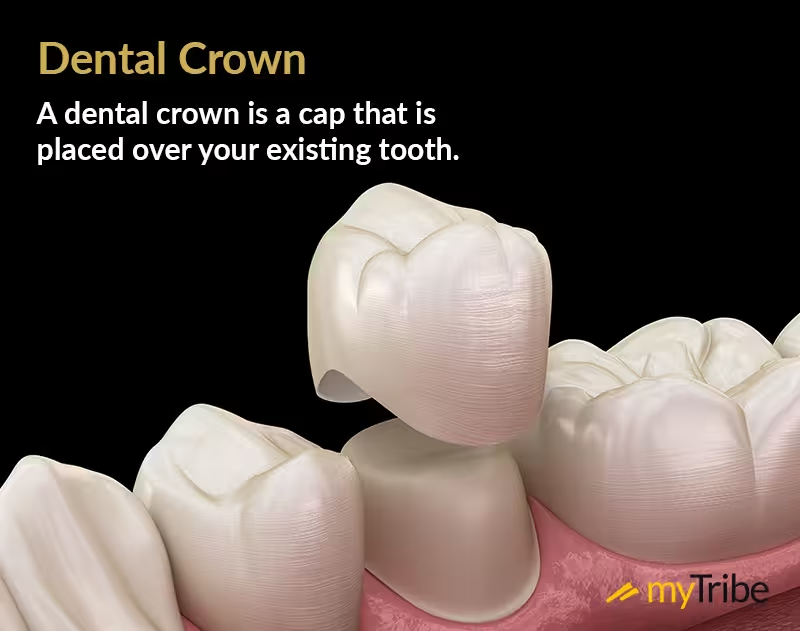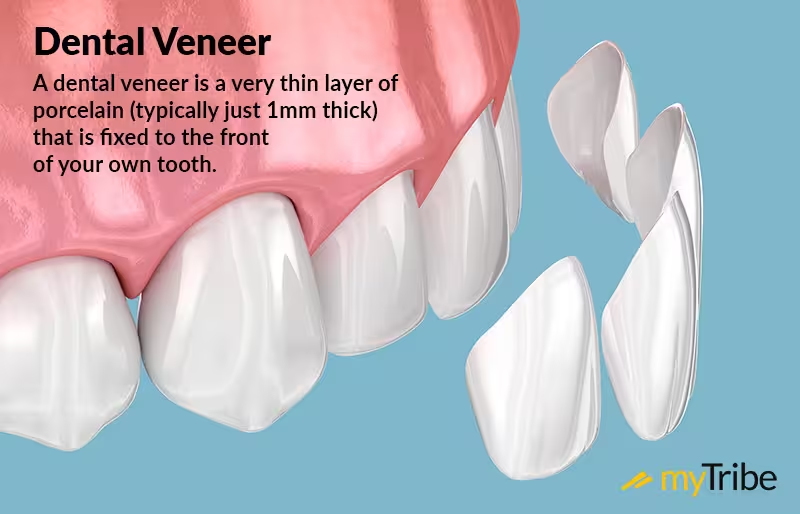What’s the difference between veneers and crowns?
Both veneers and crowns can dramatically improve the appearance of your teeth, but they’re typically used for different reasons. To give you a better idea of why your dentist may recommend one over the other, we look at the key differences, including cost and how long you can expect them to last.
What is a dental crown?
A dental crown is a cap that is placed over your existing tooth. Crowns are typically used to improve the appearance of damaged teeth or to strengthen weak teeth.
Crowns (particularly for your front teeth or any that are clearly visible) are usually made from porcelain as this closely resembles natural teeth. If you need a crown for teeth that aren’t so visible, they could be made from a ceramic material (zirconia) or a metal alloy.

How are dental crowns fitted?
Crowns are fairly labour intensive, and the process will usually be spread across two sessions. First, your dentist will need to prepare your natural tooth or teeth by filing them down to create a support for the crown. Any damaged parts of your natural tooth will also need to be removed.
A dental impression of the area will then be made so that your crowns fit the space and match your natural teeth as closely as possible. Once your crowns have been made, they’ll need to be fitted. Your dentist will fit a temporary crown while your final crowns are being made.
A veneer is a very thin layer of porcelain (typically just 1mm thick) that is fixed to the front of your own tooth. Veneers are generally only used for cosmetic treatments, for instance, if you want your teeth to be more uniform in size, shape and colour.
Veneers are normally made of porcelain as this creates a more natural look. Alternatively, you can also have veneers made of composite resin. This option is cheaper, but the results generally don’t last as long.

How are dental veneers fitted?
Your teeth still need to be prepared, but only the front of your tooth will be filed down to create a rough surface. This creates a better bonding surface for the veneers.
The veneer will then be stuck to your existing tooth.
Before you consider veneers, bear in mind that they are still considered a permanent change. If you have them, you won’t be able to simply remove them and revert back to your natural teeth.
What’s the difference between crowns and veneers?
Although they produce a similar result, there are some key differences between crowns and veneers:
Veneers typically last around ten years, while crowns can last up to 15 years. That said, lifespan will depend on the material your crowns or veneers are made from, as well as your own lifestyle habits. For instance, if you grind your teeth, you may find your crowns wear down faster compared to someone who doesn’t.
As with natural teeth, good oral hygiene can help ensure your crowns and veneers last as long as possible. You can also prolong their lifespan by avoiding smoking, and minimising food or drinks that cause staining, such as coffee.
Which is more expensive, dental crowns or veneers?
Broadly, veneers are more expensive than crowns. This is mainly down to the skill needed to make and fit them as the porcelain layer is so thin. However, ultimately cost will be affected by the type of material used for your crown or veneer and the extent of the work needed.
Dental costs can also be influenced by where you live. So, if you live in an area with higher living costs, you can expect to pay more.
To give you a very broad idea of cost, porcelain veneers can set you back in excess of £1,000 per tooth. Cheaper options are available, but porcelain provides the most natural finish.
Crowns are generally less expensive, but the material used can affect the price considerably. You can expect crowns to cost anything from £400 to over £1,000 each.
As both options are expensive, there’s been a rise in people seeking cheaper treatment abroad (known as dental tourism). While this can give you the results you want for a significantly lower cost, remember to do some research and understand the risks involved.
Why is a veneer more expensive than a crown?
Veneers are made from wafer-thin pieces of porcelain, so they are considerably trickier to make and fit. The increase in cost reflects this.
Crowns are usually the preferred option for teeth that are damaged, weak or decayed, whereas veneers are predominantly used for cosmetic reasons. Your dentist will advise which is the better option based on your specific needs.
If you want to weigh up the benefits and drawbacks yourself, here’s a quick summary:
Pros and cons of crowns
Pros and cons of veneers
The NHS provides treatment based on ‘clinical need’. In other words, you can only receive treatment that is necessary.
With this in mind, crowns are available on the NHS under band three treatment (currently £306.80). Budget considerations will usually mean that crowns on back teeth will be made of metal if they’re provided by the NHS. If you’d prefer a more natural coloured crown made of porcelain, you’ll normally need to pay for private treatment.
Veneers are typically considered a type of cosmetic treatment. This means they won’t be available on the NHS (unless there are exceptional circumstances).
Private dental insurance may cover the cost of crowns if they’re considered necessary as part of your restorative treatment. As veneers are classed as cosmetic, dental insurance won’t normally cover the cost.
If you want to find out more about what dental plans include, we’ve put together these informative guides:
· Why is it so difficult to find an NHS dentist?
· Should I go abroad for dental treatment?
Or, if you’d prefer to speak to someone about your options, contact us and we’ll put you in touch with a regulated broker who can give you tailored advice and help take you through your options.
Disclaimer: This information is general and what is best for you will depend on your personal circumstances. Please speak with a financial adviser or do your own research before making a decision.






